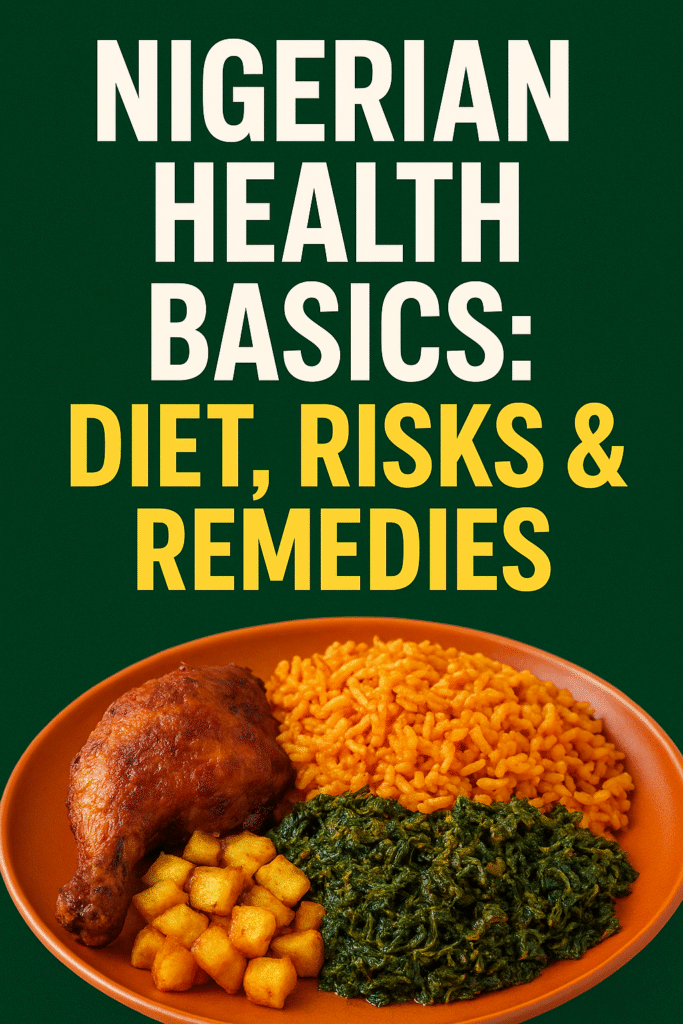Introduction: Why Nigerian Health Matters More Than Ever
Health in Nigeria goes beyond hospitals and prescriptions. It is a mix of lifestyle, local diets, traditional remedies, and everyday choices. Nigerians are facing rising health risks — from hypertension and diabetes to malaria and food-borne illnesses — yet the solutions are often within reach, from the foods in our kitchens to age-old remedies passed down by elders.
This guide explores the basics of Nigerian health: the unique Nigerian diet, the biggest health risks affecting the population, and the traditional and modern remedies Nigerians rely on. Whether you’re in Lagos, Abuja, Port Harcourt, or the diaspora, these insights are tuned to Nigerian realities.
Part 1: The Nigerian Diet – Strengths and Weaknesses
1.1 What Makes the Nigerian Diet Unique?
The Nigerian diet is colorful, diverse, and packed with energy. From jollof rice to amala and egusi, to suya and moi-moi, food is central to Nigerian life. Core staples include:
-
Carbohydrates: Rice, yam, cassava (garri, fufu), plantain.
-
Proteins: Beans, fish, goat meat, chicken, cow meat, snails.
-
Fats & Oils: Palm oil, groundnut oil, red oil.
-
Vegetables & Fruits: Ugu (pumpkin leaves), bitterleaf, okra, mangoes, pawpaw, oranges.
1.2 Health Benefits of the Nigerian Diet
-
Energy rich: Essential for the active lifestyle of many Nigerians.
-
Natural produce: Fresh farm produce is still common, especially in rural areas.
-
Superfoods: Ugu leaves, moringa, and beans are packed with nutrients.
1.3 The Weaknesses of the Nigerian Diet
-
Carb-heavy meals: Too much rice, garri, and yam without balance.
-
Palm oil excess: High in saturated fats, raising cholesterol risks.
-
Low vegetable intake: Many Nigerians eat soup with minimal vegetables.
-
Street food risks: Contamination, poor hygiene, and excess oil.
SEO tip: Nigerians are searching “Is Nigerian food healthy?” → answer: Yes, but balance is key.
Part 2: Major Health Risks in Nigeria
2.1 Hypertension (High Blood Pressure)
Hypertension is now called the “silent killer” in Nigeria. Poor diet, stress, and lack of exercise are driving cases up.
-
Prevalence: Estimated 30% of adults.
-
Causes: Excess salt, alcohol, stress, genetics.
-
Prevention: Reduce salt, walk 30 mins daily, check BP regularly.
2.2 Diabetes
Nigeria is now one of Africa’s diabetes hotspots. Many cases go undiagnosed.
-
Causes: Excess sugar, refined carbs (white bread, rice), obesity.
-
Remedies: Replace soft drinks with zobo, eat more beans, groundnuts, and vegetables.
2.3 Malaria
Still Nigeria’s number one infectious disease.
-
Causes: Mosquito bites (Anopheles).
-
Remedies: Mosquito nets, insecticide sprays, artemisinin-based combination therapy (ACT).
2.4 Food-Borne Illnesses
Cholera outbreaks, typhoid, and food poisoning are common.
-
Causes: Contaminated water and street food.
-
Prevention: Boil water, wash fruits, eat from trusted vendors.
2.5 Mental Health Challenges
Depression and anxiety are rising in Nigeria, but stigma keeps many silent.
-
Triggers: Unemployment, financial stress, family pressures.
-
Remedies: Counseling, faith support, talking to trusted friends.
Part 3: Nigerian Home Remedies and Natural Solutions
3.1 Herbal Remedies Still in Use
Nigeria has a rich tradition of herbal medicine:
-
Agbo: Bitter herbal mixture for detox and malaria prevention.
-
Ginger & Garlic: Natural immunity boosters, popular for coughs and colds.
-
Zobo drink (hibiscus): Reduces blood pressure, rich in Vitamin C.
-
Bitter leaf: Used for malaria, digestion, and blood sugar control.
3.2 Modern Scientific Backing
Some remedies now have proven scientific benefits:
-
Garlic: Lowers cholesterol and supports immunity.
-
Bitter leaf: Reduces blood sugar, combats malaria parasites.
-
Zobo (hibiscus): Evidence supports BP-lowering effects.
3.3 Safe Use of Remedies
Not all herbs are safe. Nigerians should:
-
Avoid overdosing.
-
Combine herbs with medical advice.
-
Buy only from trusted local herbalists.
Part 4: Lifestyle and Preventive Health in Nigeria
4.1 Exercise Habits
Many Nigerians don’t go to the gym, but daily lifestyle activities like walking to work, farming, or trading provide natural exercise. Still, urban sedentary life is a risk.
-
Solutions: Morning jogging, skipping rope, dance workouts, football.
4.2 Nigerian Sleep Patterns
Many Nigerians sleep less than 6 hours due to hustle culture. Sleep deprivation contributes to high BP and stress. Aim for 7–8 hours nightly.
4.3 Alcohol & Smoking in Nigeria
-
Alcohol: Palm wine and beer are common, but excess damages the liver.
-
Smoking: Shisha and cigarettes are rising among youth. Major risk for lung cancer.
Part 5: Nigerian Health System & Access Challenges
5.1 Cost of Healthcare
High out-of-pocket expenses keep many Nigerians away from hospitals. NHIS (National Health Insurance Scheme) exists, but coverage is low.
5.2 Hospitals vs Traditional Healers
Many Nigerians still visit herbalists first. A blended approach may work, but lack of regulation is a risk.
5.3 The Rise of Telemedicine in Nigeria
Apps like Doctoora, Tremendoc, and 54gene are bringing digital health closer to Nigerians.
Part 6: Remedies Every Nigerian Household Should Know
-
Salt + Warm Water: Gargle for sore throat.
-
Honey + Ginger: For coughs and immunity.
-
Palm Oil: Used in poison antidote traditions (seek hospital after).
-
Lime + Warm Water: For digestion and bloating.
-
Neem Leaves (Dogoyaro): Malaria remedy still widely trusted.
Part 7: Building a Healthier Nigeria – What Must Change?
-
Nigerians need more education on diet balance.
-
Government: Improve healthcare funding.
-
Individuals: Reduce sugar, alcohol, and smoking.
-
Families: Talk openly about mental health.
-
Schools: Promote fitness and nutrition education.
Conclusion: Nigerian Health Basics for Everyday Living
Staying healthy in Nigeria means combining the best of traditional wisdom with modern medical knowledge. From balancing our carb-heavy diets to embracing remedies like bitter leaf and zobo, Nigerians can take control of their health. The biggest lesson is that prevention is cheaper than cure.
Whether it’s protecting against malaria with nets, reducing salt to fight hypertension, or eating more vegetables, Nigerian health basics are about daily choices. And with those choices, every Nigerian can live longer, stronger, and healthier.


